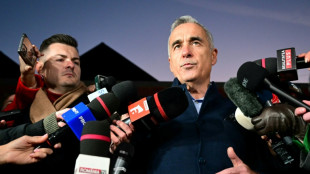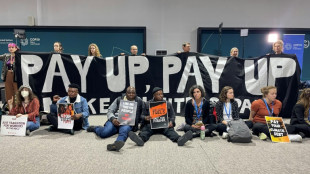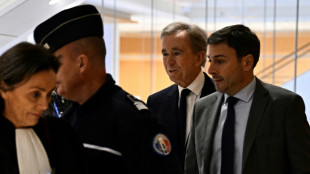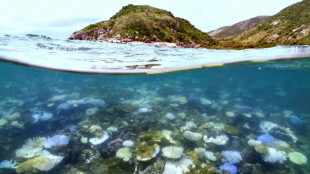
-
 In Lebanon's Tyre returning residents find no water, little power
In Lebanon's Tyre returning residents find no water, little power
-
Biden slams Trump tariff threats as 'counterproductive'

-
 TikTok tactics shake up politics in Romania
TikTok tactics shake up politics in Romania
-
'He should do comedy' says Norris of Verstappen comments

-
 Americans celebrate Thanksgiving after bitter election
Americans celebrate Thanksgiving after bitter election
-
Flood-hit Spain introduces 'climate leave' for workers

-
 UK's Starmer vows to slash net migration
UK's Starmer vows to slash net migration
-
Recount order, TikTok claims throw Romania election into chaos

-
 Jansen stars for South Africa as Sri Lanka crumble to 42 all out
Jansen stars for South Africa as Sri Lanka crumble to 42 all out
-
Bottas set for Mercedes return as Mick Schumacher quits reserve role

-
 Putin threatens Kyiv with new hypersonic missile
Putin threatens Kyiv with new hypersonic missile
-
Georgia delays EU bid until 2028 amid post-election crisis

-
 French PM announces concession in bid to end budget standoff
French PM announces concession in bid to end budget standoff
-
Guardiola's ingenuity will solve Man City crisis, says Slot

-
 South Africa in control after Sri Lanka crash to 42 all out
South Africa in control after Sri Lanka crash to 42 all out
-
'Nothing left': Flood-hit Spanish town struggles one month on

-
 Israel conducts first strike on Lebanon since ceasefire
Israel conducts first strike on Lebanon since ceasefire
-
'Unrecognisable' Mbappe and Real Madrid hurting after European woes

-
 Uber and Bolt unveil women-only service in Paris
Uber and Bolt unveil women-only service in Paris
-
French cognac workers protest China bottling plan amid tariff threat

-
 World tennis No.2 Swiatek accepts one-month doping suspension
World tennis No.2 Swiatek accepts one-month doping suspension
-
Suaalii to start for Wallabies against Ireland

-
 Farrell backs youngster Prendergast at fly-half for Aussie Test
Farrell backs youngster Prendergast at fly-half for Aussie Test
-
Suualii to start for Wallabies against Ireland

-
 Camavinga joins Real Madrid injury list
Camavinga joins Real Madrid injury list
-
Australia passes landmark social media ban for under 16s

-
 Nigerian president woos French investment on state visit
Nigerian president woos French investment on state visit
-
Contentious COP29 deal casts doubt over climate plans

-
 PSG, Real Madrid toil as giants struggle to get to grips with new Champions League
PSG, Real Madrid toil as giants struggle to get to grips with new Champions League
-
Lampard appointed manager of 'ambitious' Coventry

-
 Liberian ex-warlord Prince Johnson dies aged 72
Liberian ex-warlord Prince Johnson dies aged 72
-
K-pop band NewJeans leaves label over 'mistreatment'

-
 Sri Lanka crash to record low Test total of 42 in South Africa
Sri Lanka crash to record low Test total of 42 in South Africa
-
Putin says barrage 'response' to West-supplied missiles

-
 Lebanon MPs seek end to leadership vacuum with January presidency vote
Lebanon MPs seek end to leadership vacuum with January presidency vote
-
Eurozone stocks lift as French political stand-off eases

-
 French farmers wall off public buildings in protest over regulations
French farmers wall off public buildings in protest over regulations
-
France says ready for budget concessions to avert 'storm'

-
 Lampard appointed Coventry manager
Lampard appointed Coventry manager
-
French luxury mogul Arnault defiant at ex-spy chief trial

-
 South Africa bowled out for 191 against Sri Lanka
South Africa bowled out for 191 against Sri Lanka
-
'Europe's best' Liverpool aim to pile pain on Man City

-
 Hezbollah under pressure after war with Israel
Hezbollah under pressure after war with Israel
-
OPEC+ postpones meeting on oil output to December 5

-
 Zelensky slams Russia's 'despicable' use of cluster munitions in energy strikes
Zelensky slams Russia's 'despicable' use of cluster munitions in energy strikes
-
One dead, thousands displaced as floods hit southern Thailand

-
 Lebanon army deploys under Israel-Hezbollah ceasefire
Lebanon army deploys under Israel-Hezbollah ceasefire
-
Imran Khan's wife Bushra Bibi emerges as Pakistan protest figure

-
 COP16 biodiversity talks to restart in February: UN
COP16 biodiversity talks to restart in February: UN
-
Iran to hold nuclear talks with three European powers


'Tito tour' in Croatian capital delves into strongman's legacy
With no street or statue to remember Yugoslavia's late strongman Josip Broz Tito, a new tour in the Croatian capital Zagreb is hoping to trace the leader's complicated legacy in a city where he remains divisive.
Adored by some and hated by others, Tito remains a polarising figure four decades after his death across the former Yugoslav republics, including Croatia, where he helped usher in prosperity and authoritarianism alike.
The tour's curator Danijela Matijevic said the idea for the project came in 2017, after authorities in Zagreb stripped Tito's name from a prominent square.
The move was the latest in a string of measures over the years aimed at ridding the country of its Yugoslav past, removing plaques and monuments along with renaming streets and squares.
But for Matijevic, history still matters.
"Tito was definitely one of the 20th century's political giants," Matijevic said.
- Walk with Tito -
The "Walk with Tito" tour, launched last year, takes people to eight sites in downtown Zagreb linked to the Croatian-born leader and the anti-fascist movement he founded at the start of World War II, commonly known as the Partisans.
It stops at the square once named after Tito, the main railway station where Croatia's pro-Nazi regime deported people to concentration camps, and a passage named after two sisters who were resistance heroes.
The tour does not indulge in sugar-coating the past as it explores Tito's successes along with his share of failures.
The late leader is known for charting a middle road for the socialist federation he founded, siding neither with the United States nor the Soviet Union during the Cold War.
"Tito had good relations with the West but did not neglect good ties with the East either, positioning Yugoslavia somewhere between and benefiting from both," said Zagreb-based historian Hrvoje Klasic.
The move kept Yugoslavia out of the Cold War's chaos and made it the most prosperous communist country.
But there was also repression and simmering nationalism that exploded after his death, leading to the bloody dissolution of Yugoslavia which sparked a series of wars and killed around 130,000 people in the 1990s.
Following the conflicts and Croatia's independence, Tito and Yugoslavia have been largely disregarded, deemed an aberration in the country's past.
But for Matijevic, Tito and his legacy are also personal -- two of her grandparents fought with his Partisans during World War II.
During a two-year stint in Germany, Matijevic was inspired by how the country had grappled with its past, and this helped lay the groundwork for the Tito tour project.
"(I was) amazed how Germans handled their turbulent 20th century history," Matijevic said.
- 'Our history' -
The guide's attempt to delve into Croatia's past has not been entirely smooth.
Since starting the tours, Matijevic has been targeted with abuse on social media and has also been threatened with outright violence, in a case being investigated by authorities.
In December, right-wing politician Igor Peternel also slammed the Zagreb tourist board for including information about the tour in its brochures, lambasting the body for "promoting Tito and Yugoslavia".
"It is absolutely unacceptable... an ideological provocation and shame," said Peternel, a member of the capital's city council.
But many who have taken the tour found it worthwhile.
Economist Vedrana Basic said she was pleased "to learn something new", adding that it was rare to "hear much about Tito in Zagreb" these days.
"We should capitalise on our history in a touristic sense regardless what one may think about some of its parts", Simic said.
T.Bondarenko--BTB
